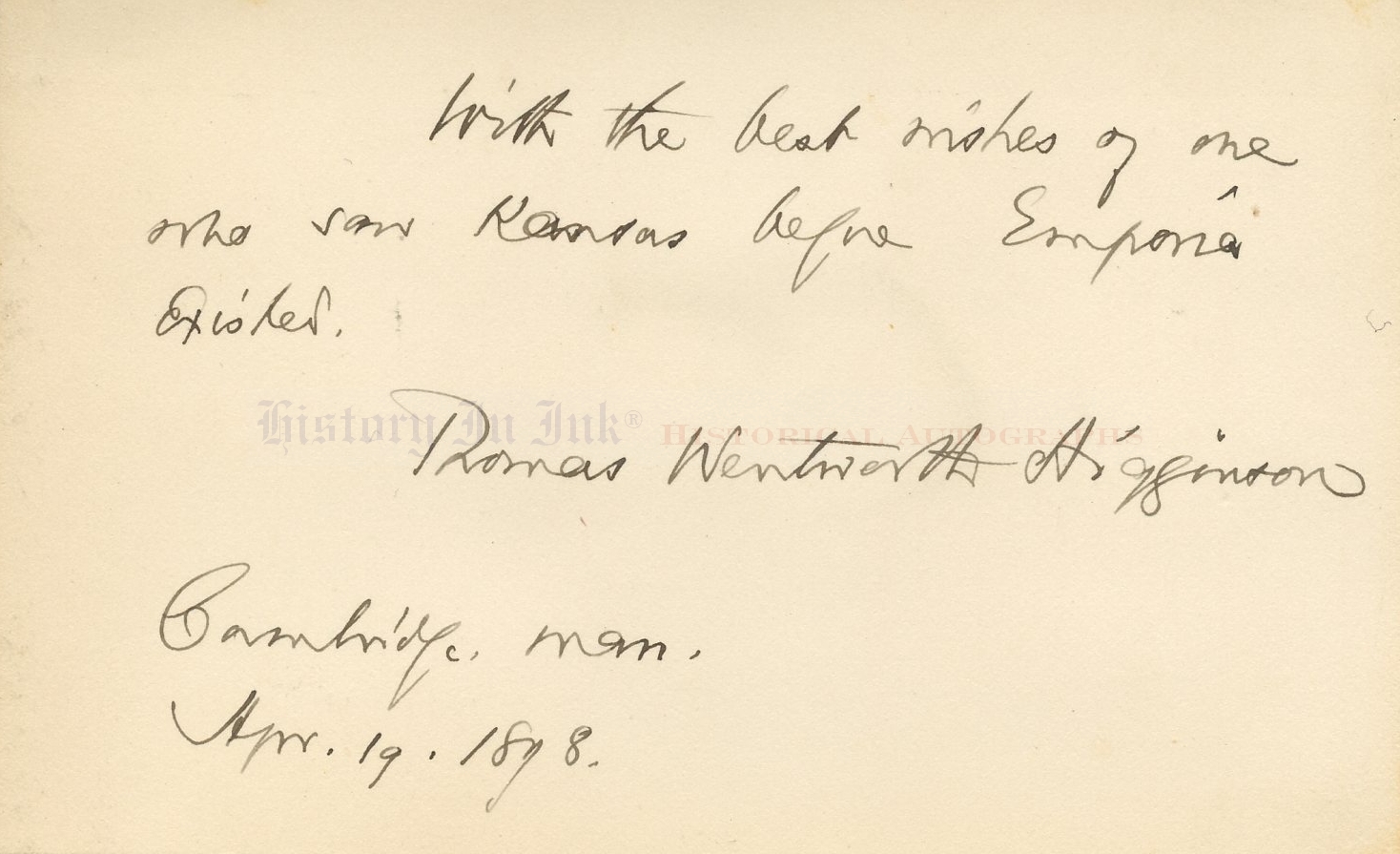1007404
Thomas Wentworth Higginson
Scroll down to see images of the item below the description
Higginson refers to his abolitionist activities, writing that he “saw Kansas before Emporia existed”
Thomas Wentworth Higginson, 1823–1911. American minister, abolitionist, and women’s rights activist; Colonel, 1st South Carolina Volunteers, American Civil War. Autograph note signed, Thomas Wentworth Higginson, on a 3” x 5” card, Cambridge, Massachusetts, April 19, 1898.
This is an outstanding piece for any abolition or slavery collection. In this short note, Higginson directly refers to his abolitionist activities in Kansas before the Civil War.
Higginson was a supporter of militant abolitionist John Brown, who led bloody opposition to slavery in the Kansas Territory in the mid- to late 1850s. Higginson was also one of the Secret Six, or the Committee of Six, who helped to raise money and supplies in support of Brown’s raid on the federal arsenal at Harper’s Ferry, West Virginia, which Brown intended to spawn a slave uprising. Higginson raised money for Brown’s defense after he was captured and made plans to help Brown escape from prison.
Here Higginson responds to a request from a student at the State Normal School at Emporia, Kansas, now Emporia State University, for a handwritten letter containing a reminiscence, a favorite sentiment, or a word of advice for one of several autograph albums to be devoted to the country’s prominent men and women. He writes: “With the best wishes of one who saw Kansas before Emporia existed.” Beneath his signature, Higginson has dated the piece at “Cambridge, Mass. / Apr. 19, 1898.”
Higginson was a Unitarian minister who eventually became a radical and militant abolitionist. Following enactment of the Kansas-Nebraska Act in 1854, which essentially repealed the Missouri Compromise by authorizing residents of the Kansas and Nebraska Territories to decide whether they would allow slavery within their boundaries, Higginson organized a group of settlers on behalf of the New England Emigration Aid Company, a transport company that sought to carry anti-slavery immigrants to the Kansas Territory in an effort to shift the balance of power and bring Kansas into the Union as a free state.
It was in Kansas where Higginson likely met Brown, who believed that God had chosen him to end American slavery and thought that force would be necessary to do it. From 1854 to 1859, the violence between anti-slavery forces in Kansas and pro-slavery forces who came across the border from Missouri, a slave state, was so bad that it gave rise to the names “Bleeding Kansas” and “Bloody Kansas.” On May 24, 1856, Brown led anti-slavery supporters in killing five pro-slavery supporters in front of their families in the Pottawatomie massacre, which was a response to the pro-slavery sacking of Topeka, Kansas, on May 21.
Thus, as Higginson says in this note, he “saw Kansas before Emporia existed.” Emporia was founded in 1857.
When Higginson returned to to New England, he helped to organize the Massachusetts Kansas Aid Committee, which offered assistance to Kansas settlers. When he returned to Kansas on behalf of the Committee, he became convinced that abolition could never be peaceful. In 1857, he organized the Worcester Disunion Convention, the stated goal of which was abolition of slavery in the United States even if abolition would lead the country into sectional war.
Higginson has written this note on the back of an unused, preprinted card from the Colonial Club by which members could invite others to use the clubhouse. The Colonial Club was founded in 1890 and was one of the most prominent social organizations in Cambridge, Massachusetts, where Higginson datelined this note, for some 40 years. Harvard University acquired the clubhouse in 1929, and the club’s membership merged with Harvard’s Faculty Club, which still exists.
This is a beautiful autograph. Higginson has written and signed in black. The note shows only a tad bit of soiling. There is a large stain with mounting remnants obscuring part of the preprinted Colonial Club invitation on the front of the card, but the stain does not bleed through. Overall the piece is in fine condition, and were it not for the mounting remnants and stain it would be very fine.
Unframed.




